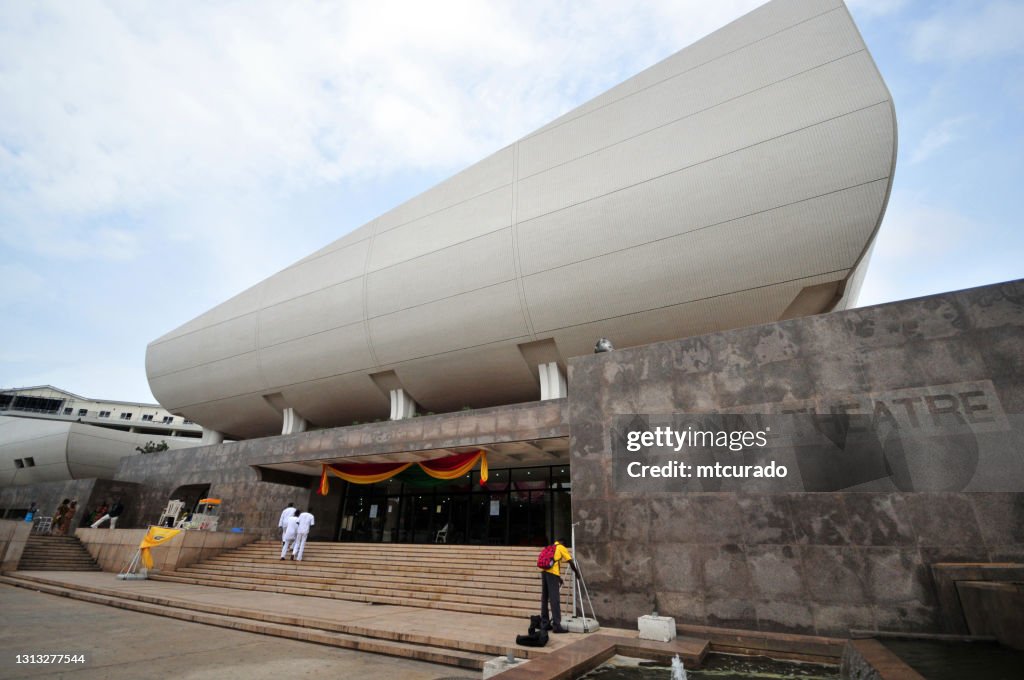
The National Theatre of Ghana, a symbol of cultural heritage and artistic expression, stands as a proof to the nation’s commitment to arts and culture. However, the current state of this iconic institution paints a grim picture, reflecting years of neglect and inadequate maintenance. The National Theatre, which once stood as a shining beacon of Ghana’s cultural richness, now lies in a deplorable condition, desperately in need of restoration.
Located in Accra, the National Theatre was officially opened on November 30, 1992, and has since played a pivotal role in promoting and preserving Ghana’s cultural heritage. Its grand architecture and state-of-the-art facilities made it a nucleus for performing arts, including theater, dance, music, and conferences. It was envisioned as a space where Ghanaian culture and creativity could flourish, providing a platform for both local and international artists to showcase their talents.
In the face of its early splendor, the National Theatre which was designed by the renowned architect Joseph Kofi Addo has fallen into a state of shabbiness, and its facilities are woefully inadequate for the thriving arts scene in Ghana. The signs of decay are visible throughout the complex.
It appears as though there are no persons regulating the facility, meanwhile citizens pay huge sums of money before using the space. Who then receives these money?
Governments, both present and gone have been severely disparaged for the poor state of the edifice although there are individuals who are assigned for welfare and maintenance.
The general overseer of International Central Gospel Church in Accra, Mensa Otabil recently added his voice while speaking at the Experience Conference 2023 organized by Dr. Michael Boadi Nyamekye of Marker’s House Chapel.
The man of God described the current state of the National Theatre as being “under severe malnourishment”.
READ MORE
The clergy is not the only public figure to have demonstrated his dissatisfaction about the poor state of the National Theatre. A news item by Ghanaweb states how many event organisers, patrons and arts professionals have complained over the years about what I call “disgraceful” state of the National Theatre, some of these stakeholders have advocated for the intervention of government to close down the facility for renovation.
The sorry state of the National Theatre is not just a cultural tragedy; it is also an economic one. A thriving arts and culture sector can significantly contribute to a country’s economy by attracting tourists, creating jobs, and boosting local businesses. The restoration of the National Theatre is not just a matter of preserving heritage but also an opportunity to invigorate the cultural and economic landscape of Ghana.
As a concern Ghanaian, I would be excited to see the National Theatre leapfrog its elegance state.
However, being a citizen and not a spectator, these are some tips for the authorities in order to address these problems;
I do not know how this can be done but the National Theatre’s renovation and ongoing operations should be overseen by a professional management team, assuring their effective and long-term operation.
Involve the local community and artists in the renovation process to develop a sense of ownership and pride in the theatre.
Partnerships between the public and business sectors should be encouraged in order to raise money and resources for the renovation effort.
In a situation where the above points could not could not help, given the National Theatre’s crucial significance in the cultural and economic development of the country, the government just as it did in the case of the Kwame Nkrumah Memorial Park should allocate funds for the National Theatre’s renovation.
The appalling condition of Ghana’s National Theatre is a source of concern not only for the artistic community, but for the entire country. It is a cultural treasure that must be safeguarded and revived. Urgent effort is required to restore the theatre to its former awe, ensuring that it remains a symbol of artistic expression and cultural enrichment for future generations. A dynamic and well-maintained National Theatre is essential to Ghana’s cultural legacy.
